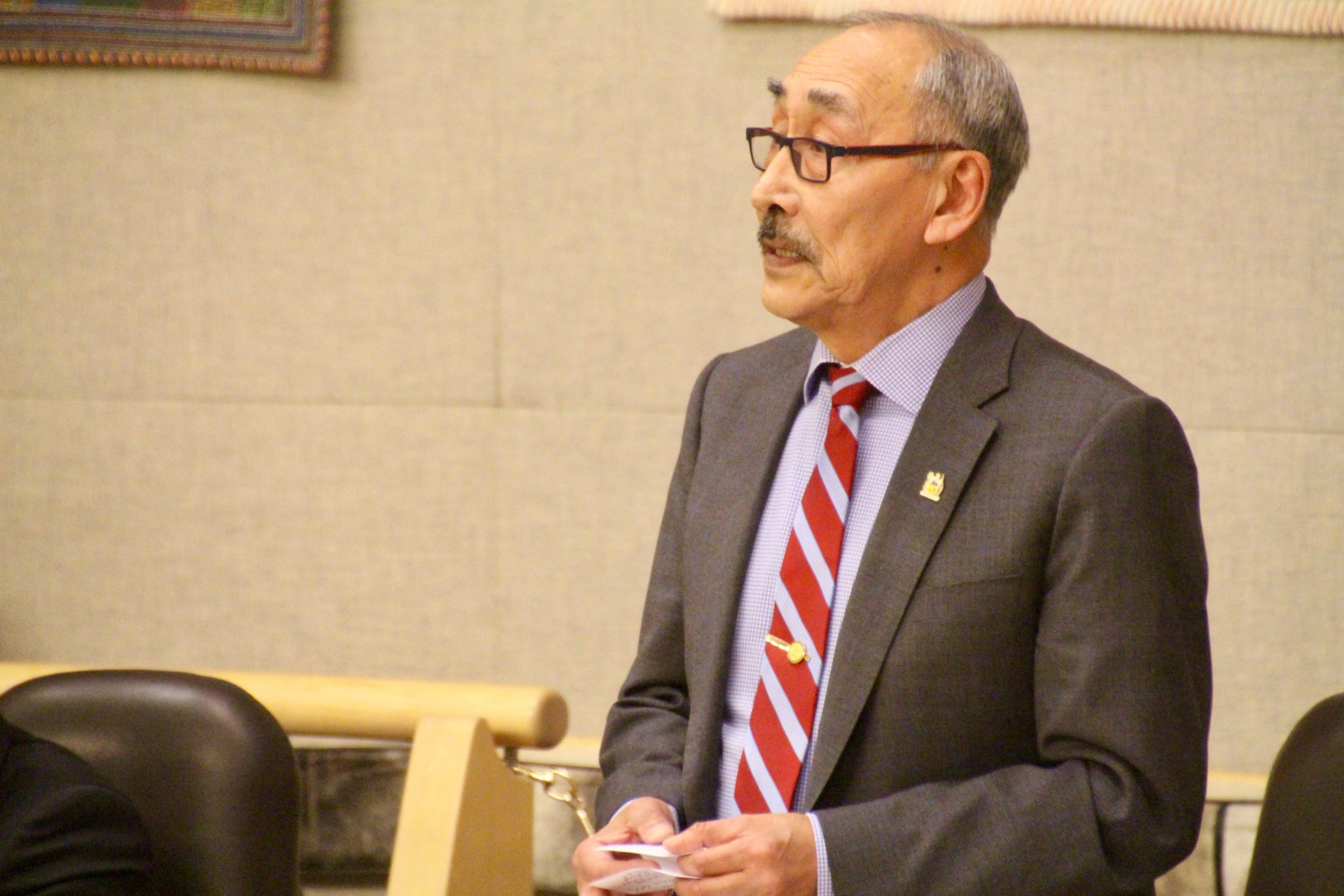Nunavut government wants answers from feds on dropped child sex charges
Quassa asks for more info on extradition of Johannes Rivoire
Aggu MLA Paul Quassa calls on the Nunavut government to take a stance on dropped charges against a fugitive priest who was alleged to have assaulted Inuit children in the 1960s. (File photo)
Nunavut Premier Joe Savikataaq is sending a letter to the federal government expressing dissatisfaction over charges stayed against a fugitive priest accused of sexually abusing Inuit children.
Savikataaq made the commitment in the legislature on Tuesday, Feb. 26, after facing questions from Aggu MLA and former Nunavut premier Paul Quassa on the subject.
Quassa asked during question period if the Government of Nunavut was prepared to take a stance on news that Father Johannes Rivoire will not stand trial because he is living in France, a country that does not have an extradition treaty with Canada.
This news was reported by CBC last week following an access-to-information request. The charges were from 1997, and the RCMP were seeking to arrest the man based on allegations of child sex abuse in Nunavut communities during the late 1960s.
As premier, Quassa had sent a letter to the Canadian government asking for an update on Rivoire, but he received no response. In that letter, Quassa urged the federal government to extradite Rivoire from France.
“It is obvious that all of us here in Nunavut all feel slighted by this event. Although we are told to be resilient, the federal government shouldn’t throw up their arms and give up,” Quassa said. “Can you write another letter about Nunavut’s dissatisfaction because it’s very important for the people of Nunavut?”
Savikataaq called it “unfortunate” that the charges were dropped and said that while the government would work in support of abuse victims, this situation was outside the territory’s purview.
“It is very unfortunate for the victims that Canada has stayed the charges,” Savikataaq said.
People charged with assault should be taken to court, he said.
“I can say that I can write the letter and I will write the letter because it is deeply felt by the people of Nunavut and the previous premier’s letter was not responded to, the letter to the federal government, so I will write another letter and ask to be replied to because we are not satisfied with this,” Savikataaq said.
Quassa went on to say that the dropped charges reflect poorly on federal efforts at reconciliation with Inuit for past trauma, including federal apologies for treatment of students in residential schools.
Rivoire’s alleged victims suffered long after the abuse ended, say friends and supporters, due to struggles with substance abuse.
Such was the case with Marius Tungilik, who died in 2012. He had been the first to publicly speak out about sexual abuse at the Sir Joseph Bernier residential school in Chesterfield Inlet, where Rivoire served as a missionary.
Rivoire is also known to have worked in Arviat, Naujaat, Rankin Inlet and Baker Lake. He is in his late 80s.






A small clarification: Canada does have an extradition treaty with France, but neither country is obliged to hand over its own citizens; instead, the requested country tries the accused at home for crimes allegedly committed elsewhere. France has an internal law that forbids handing over its own citizens, and it has never done so, but it has, for example, tried and convicted French citizens for murders committed in the USA.
I dream of the day when Nunavut goes after the home-grown rapists and child molesters of today, the ones they can actually do something about, as hard as they go after those from decades ago who are not even in Canada any more. They probably had to stay the charges as there is no hope of succeeding if they bring him to trial, and not enough evidence to get France to cooperate.
So instead, put the resources into finding and charging today’s child molesters. Do it for the kids. Preventing tomorrow’s crime is always more urgent than relentlessly pursuing some old man from long ago in another country. And don’t forget to put their names in the paper, too.
Dealing with the past wrongs is a means of reconciliation. Both present and past sexual abuses need to be dealt with. I totally agree with you that we need to take care of today, so the victims of today do NOT end up with so much turmoil, anger, unhappiness, low self esteem, being violet to others when they don’t want to. The constant nightmares, being afraid to sleep in the dark, they can become more peaceful, non self destructing, more productive and happier members of society.
Thank you for your comments, Theresie. Beautiful name too (my mother’s).
I take umbrage with only one of your comments: “Dealing with the past wrongs is a means of reconcilitaion” That is not true. The delusion of that belief is the underpinning of many wars and innumerable Hatfield–McCoy feuds.
Dealing with history is only useful as a means of learning or, if the perpetrator of past wrongs is still alive, in doing justice. We do not chase after the offspring of criminals for punishment or compensation. Societies that condone such behavior are twisted at best and most likely corrupt.
“The delusion of that belief is the underpinning of many wars and innumerable Hatfield–McCoy feuds.” an odd comparison to truth and reconciliation.
Reconciliation is the means to “more peaceful, non self destructing, more productive and happier members of society.”
The United States “Hatfield–McCoy feuds” story is not the truth and reconciliation that calls for action.
Our politicians will drivel on about things long ago and far
away.
They will not do a thing about evil being done to children,
and vulnerable elders in their own communities.
A few years ago I volunteered to help youth and elders,so I
did what our highly paid experts and politicians do.
I did not do anything.
France will not hand over Rivoire, that much is clear. He’s close to 90 and they don’t extradite their own citizens, however the Canadian Government could pressure the French to try him in France. Or they could lay charges again and try him in absentia if there is a reasonable amount of evidence/witnesses to assure a conviction.
https://laws-lois.justice.gc.ca/eng/acts/c-46/section-475.html
I know the victims and their families want justice and closure on this.They can’t forget anymore than the victims of Nazi Germany can forget. I also know that the government has probably already looked at every option to bring Rivoire to justice, It is a very difficult situation but hopefully the government will exert additional pressure to bring this matter to a close.
I’m not sure, but have heard that France does not extradite its citizens to a country that has a different legal system than theirs ( Civil Law ), while Canada has dual ” Common Law ” and ” Civil Law ” ( Quebec ) legal system, would this also be a Napoleonic Code ?, would this make Canada have a similar legal system to France?